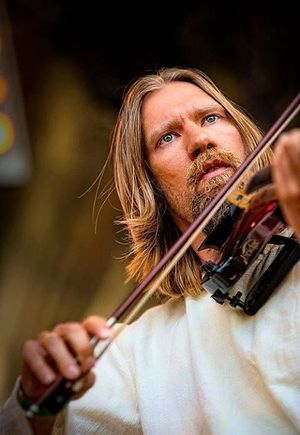Tuomas Rounakari
Tuomas Rounakari | |
|---|---|
 | |
| Born | 1977 |
| Nationality | Finnish |
| Citizenship | Finland |
| Alma mater | Kerava School of Music |
| Occupation | Violinist Composer Ethnomusicologist |
| Years active | 2009 - present |
| Website | rounakari |
Tuomas Rounakari (1977) is a violinist, composer, ethnomusicologist (MA) and an educator from Finland. He has collaborated with artists from different arctic indigenous cultures and has studied shamanism and ritualistic music of the northern Eurasia.[1]. He is also considered a key figure in revitalizing the near extinct tradition of Finnish-Carelian Lament singing[2] .
Tuomas Rounakari is a violinist of a Finnish folk-metal band Korpiklaani and an active solo performer. He is a co-founder of a finnish theatre group Ruska-Ensemble and its musical director[3]. He has also done field-work among the Khanty people in Siberia [4].
Early years
Rounakari (formerly Laurinen) began playing classical violin at the age of 6 in Kerava School of Music, Finland. He performed often in the student recitals of the school, and while performing he experienced a trance state where he lost the sense of time and place and even the sense of self, becoming fully emerged with the music [5]. During his adolescence this phenomenon vanished and it led to artistic explorations outside of classical music. He gravitated towards improvisation and anything avantguard.[5][6]
During 1998 to 2001 Rounakari studied in New York City at the New School that housed a jazz- and contemporary music division established by bass playerReggie Workman. His most influencal teachers were a conductor and producer Robert Sadin, Kathleen Battle|Kathleen Battle, Sting (musician), Herbie Hancock and percussionist Jamey Haddad ( Paul Simon band)[5][7].
Solo career
The search back to the trance state experiences of early childhood led to Rounakari’s interest towards ritualistic and shamanistic music. From the finnish archives in Helsinki, he found wax-cylinder recordings made by an early ethnographer Kai Donner in the years 1912-1924. The recordings included authentic shaman songs from various indigenous peoples from Siberia. By studying these songs with his violin, Rounakari found a way back to the trance state experiences[7].
The first solo album Shamanviolin was released in 2009. Rounakari has an ordinary violin, but he uses alternative tunings and playing techniques. Sometimes he also uses random tunings[8].
Laments
Rounakari joined the finnish association Ääneelä itkijät in 2002. The association searched ways to revitalize a near-extinct finnish-carelian lament tradition and was calling for multidisciplinary action to achieve its goal. Together with Pirkko Fihlman, Rounakari developed a method of teaching laments to people without any prerequisites[2]. Today, laments are considered a living musical tradition in Finland with hundreds of active practicioners [2][9][10].
Since 2017 Rounakari has been helping the revival of a keening tradition in Ireland[11].
Compositions
As a composer Rounakari has been most active among theatre, writing music and sound design for major finnish institutions including The Finnish National Theatre. His love for arctic themes is visible in these works also. in 2010 he co-founded a theatre group Ruska Ensemble with an actor Jarkko Lahti and writer director Ari-Pekka Lahti. Ruska Ensemble is conserned of the ecological and cultural future of the arctic regions. It’s aim is to find alternative ways to approach and perceive the world[12].
There first work was a dramatication of the Khanty author Jeremei Aipin’s Last Morning Star wich was also performed at the Theatre of Ob-Ugrian people in Khanty-Mansijsk, Siberia in 2013. The following performances were a collaboration witn Beaivvaš Sámi Našunálateahter (the Sámi national theatre) about the iconic Sámi artist Nils-Aslak Valkeapää Aillohás - Son of the Sun (2014) and a collaboration Arctic Odyssey (2017) with the Inuit national theatre Nunatta Isiginnaartitsisarfia from Greenland and independent Sámi and Chuckhi artists. Both plays were premiered at the Finnish National Theatre in Helsinki and then toured international festivals[12].
Rounakari’s Bear Feast performance ´Karhunpeijaiset´ (2016) was based on his field-trips to Khanty-Mansijsk and a Bear Feast documentary of the Khanty people of Berjosova region. Bear Feast was performed alongside with musicians Pekko Käppi, Antti Paalanen and Karoliina Kantelinen. The Bear feast was a combination of mythical songs, instrumental music, theatrical performances and communal dances.[13][14]
Rounakari wrote the film score for two films Fata Morgana (2004) and Earth Evocation (2009) by internationally awarded art film directors Markku Lehmuskallio and Anastasia Lapsui. [15]
In the media
Discography
As a violinist, arranger and composer
2018 Korpiklaani: Kulkija. 2017 Korpiklaani: Live at the Masters of Rock
2015 Korpiklaani: Noita.
2012 Korpiklaani: Manala
2009 Tuomas Rounakari: Shamanviolin
1996 F-train feat Jari Perkiömäki: Fairytales. CD-single
As a producer, arranger
Äänellä itketty - Itkuvirsiä tämän päivän Suomesta
2010 Simo Saari: Muistoissa
As a featuring artist
2019 Aarniseppä: Metsänväki
2016 Aarniseppä: Hyönteisten temppeli
2011 Mikael Bergholm: Cantama2
2004 Tom Rossi: Salma Har
External links
References
- ↑ "Rounakari, Tuomas". Kansanmusiikki. 2008-01-07. Retrieved 2020-02-24.
- ↑ 2.0 2.1 2.2 Tenhunen, Anna-Liisa. (2006). Itkuvirren kolme elämää. SKS. ISBN 951-746-809-1. OCLC 85041235.
- ↑ "HOME". Ruska-Ensemble (in suomi). Retrieved 2020-02-24.
{{cite web}}: CS1 maint: url-status (link) - ↑ "Tuomas Rounakari - Encyclopaedia Metallum: The Metal Archives". www.metal-archives.com. Retrieved 2020-02-24.
- ↑ 5.0 5.1 5.2 Shamaaniviulisti tutkii sukulaiskansoja ja soittaa metalliaLena Nygård, Maaseudun tulevaisuus 12-19-2015
- ↑ Shamaaniviulistia vie tunneyle.fi 09-10-2011
- ↑ 7.0 7.1 Musiikki avaa dialogin myyttiseen maailmaanAnna Tosha Einiö, Minä olen -lehti, 10-15-2018
- ↑ "Rounakari plays with a random tuning".
{{cite web}}: CS1 maint: url-status (link) - ↑ Lötjönen, Kaisu (2011-07-08). "Itkuvirsi purkaa sielun patoumia". yle.fi.
{{cite web}}: CS1 maint: url-status (link) - ↑ "Etusivu". www.itkuvirsi.net. Retrieved 2020-02-24.
- ↑ [ https://atimetogather.ie/2020/01/27/restoring-keening-lament/ Restoring keening lament]atimetogether.ie 01-27-2020
- ↑ 12.0 12.1 "ABOUT". Ruska-Ensemble (in suomi). Retrieved 2020-02-24.
{{cite web}}: CS1 maint: url-status (link) - ↑ Yhteistuotannot 2013-2016 hoyhentamo.fi
- ↑ Loppuunmyyty: Karhunpeijaisetuniarts.fi
- ↑ "Tuomas Laurinen". IMDb. Retrieved 2020-02-24.
This article "Tuomas Rounakari" is from Wikipedia. The list of its authors can be seen in its historical. Articles taken from Draft Namespace on Wikipedia could be accessed on Wikipedia's Draft Namespace.